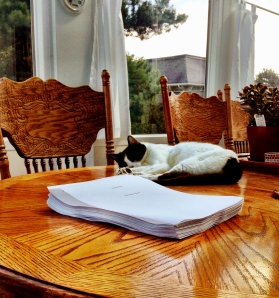"When I've painted a woman's bottom so that I want to touch it, then [the painting] is finished." Pierre Auguste Renoir (1841--1919).
Last October, two-thirds of the way through a desperately messy first-ish draft of Refuge of Doves, I turned to my husband and declared, "I'll finish this thing because I've come this far, but once I get to The End, it's going into a drawer." There was little worth salvaging other than a learning experience.
But then I joined a writing group, and since I had to share something, I gave them chunks of the novel each time we met. They encouraged me to go on. Then came a few beta readers, whose feedback inspired me further. In the spring, I undertook a major rewrite, changing point-of-view, tone, themes, even the ending.
I don't have any stats, but I reckon most unagented writers do not seek professional editors before submitting their manuscripts to the Slush Piles of Doom (aka: Literary Agent E-mail Inboxes). The usual course is to seek an agent. If the book is picked up, the agent will tear apart your manuscript before she tries to sell it and you to a publisher. And if she succeeds in finding a publisher, your assigned editor will tear apart your book all over again. Why would someone pay cash money for something all sorts of people will do for "free" on your behalf?
Because the publishing world is changing and hand-holding agents are becoming a remnant of a sepia-and-whiskey-toned past. Because all the writing groups and beta readers in the world, at least in my writing world where most are aspirants like me, don't have the skills, time, courage, or interest to tell me what I need to know. Because I'm pretty good with the little voices. Listening to them, that is. And the little voices said, "There's something here worth believing in. But it's not ready . . ."
Do you know what I thought would happen? I thought my editor would return Refuge of Doves with a heartbreaking assessment of all the many ways my plot fell flat, my characters said ridiculous things, or tripped over themselves in a hurry to get out of my way. Let's face it, I'd bitten off a big chunk of crazy by mixing historical fiction with contemporary with religious intrigue with romance with supernatural with winemaking. Hang your disbelief at the door, please.
But that's not what happened. She LIKED it! Hey, Mikey!! Yes, of course, there were wobbly bits and I had to rewrite a scene here and there and rearrange a few others, but at first glance of her edits, I thought, This is going to be easy.
Heh heh heh.
What really did happen is hard for even this writer to articulate. In the course of six weeks of rewrites, I changed. My writing changed. Seeing, hearing, feeling my words through someone else's perspective took me inside my brain and I began to toss things from that cluttered closet. One outstanding beta reader led me inside this mind-closet over the winter, prompting my spring rewrite. But I'd still leaned into that closet door with my hip and shoulder to shove it all the way shut. This time, most everything I threw into the hallway went straight into the rubbish bin.
Working with a professional editor was the clean sweep this story, and my writing, needed. She exposed my bad habits, while showing me the tendencies that are a part of my writing and storytelling voice, and how refining, correcting, and tightening my language would strengthen that voice. But, aside from an occasional suggestion, her comments weren't prescriptive or instructional—they were all show, don't tell. She gave me the tools I needed to come to an understanding of my writing and make changes on my own.
In the first post-edit revision, I waged war on comma splices and clichés and conjunctions. Another read-through and I tore into it again, considering the rhythm of each sentence and how it fit into the melody of the sentences around it. I let go of the need to make certain the reader was thinking, feeling, seeing, hearing what I thought they should and allowed the language to settle into itself, to belong more to the story and the characters than to me.
With my heart in my throat, I returned the manuscript to my editor for her second pass edit, expecting to hear a scream that would splinter the Continental Divide. I'd sent back a mess of Track Changes that looked as if a child had splattered fingerpaints over 320 pages of Times New Roman 12-point.
That didn't happen, either. My editor cleaned up my mess, praising me for the work I'd done during those long weeks, my Summer of Revision. And here sits my manuscript, white and full, like one of Renoir's women. For accessories, she boasts a query letter and a synopsis. She's ready to be presented to the Literati. 
I believe, for better or for worse, that I must present to potential agents and publishers the very best this story can be. And if I choose to shepherd Refuge of Doves along the independent publishing road, I know I've considered my readers with that same spirit of respect and hope.
Today I begin the second draft of my second novel. Don't worry. I've got this. For a while, anyway.
